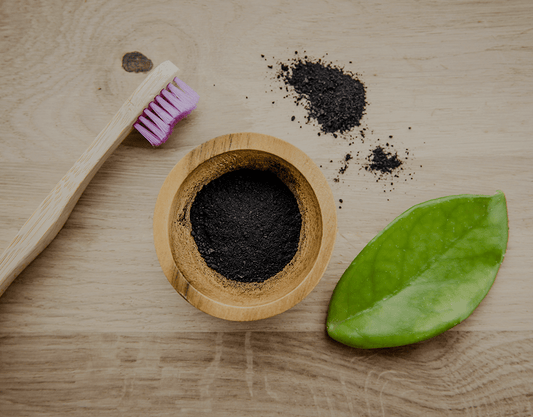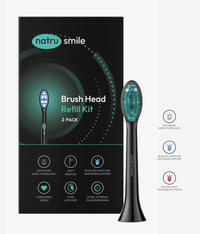
All products are certified by dental expert Dr. Greg Grillo
Imagine a world where unsightly, dark stains on your teeth are a thing of the past. The key to achieving that bright smile you've always dreamed of lies in your daily dental hygiene routine. With numerous teeth whitening options at your disposal, it's essential to choose wisely.
You might be surprised to learn that traditional toothpaste may not be the most effective teeth whitening option for everyone. Enter tooth powder - an age-old remedy refined for the modern era, and often recommended by dentists as an alternative for those who should steer clear of certain ingredients found in regular toothpaste.
Navigating the world of tooth powders can be daunting without familiar brands like "Crest" or "Oral-B" to guide you. We're here with invaluable tips and advice to help you select the perfect tooth powder tailored just for you. Let's embark on this journey together towards an attractive smile!
Tooth Powders: Overview
When making a decision, it helps to understand what tooth powder is. In simplest terms, tooth powder is a combination of crushed ingredients that gently clean, protect, and refresh the teeth and gums.
After being mixed with water, the chemical compounds in the powder mix together, breaking down plaque and leaving you feeling your best.
Before toothpaste was widely distributed, individuals would mix together their own tooth powder concoctions at home, hoping to get a brighter, healthier smile. Ingredients like baking soda and chalk were often thrown into the mix, but now tooth powders are produced in a more refined manner.
What Is The Main Ingredient In Tooth Powder?
The main ingredient in tooth powder is calcium carbonate. Calcium carbonate is a naturally-occurring mineral that helps to gently remove plaque and surface discoloration from teeth. It is also a safe and effective polishing agent, which helps to smooth rough spots on the teeth that can trap bacteria and discolor your teeth.
Calcium carbonate is an essential ingredient in tooth powder because it helps to balance the pH in the mouth, helping to reduce the risk of cavities, decay, and gum disease.
Natural tooth powder typically contains this, along with other natural ingredients that are abrasive enough to scrub away plaque but gentle enough not to damage the enamel of your teeth.
Home ingredients like baking soda and coarse salt are often added to help improve flavor and increase the efficacy of the tooth powder. Organic ingredients, such as herbs and essential oils, are also often found in tooth powder for a fresher, cleaner feeling.
Is Tooth Powder As Good As Toothpaste?
Without a doubt, toothpaste is used far more than tooth powder. This has mostly to do with convenience, as toothpaste is readily available and often cheaper than tooth powder. When it comes to tooth powder vs. toothpaste, however, tooth powder has its own advantages.
While most studies have found that the efficacy of tooth powder and toothpaste are about the same when fighting plaque, tooth powder is shown to have a slight advantage over its more widespread competitor.
Both products can contain a healthy amount of fluoride, the mineral that breaks down and prevents plaque on your teeth.
Fluoride is extremely effective at preventing cavities, too. Even with its benefits, however, sometimes patients will be advised to stay away from fluoride. If you're looking for a way to keep your teeth clean and healthy – while steering clear of fluoride – you're likely to find more fluoride-free powders than pastes.
Does Baking Powder Help With Yellow Teeth?
One clear advantage tooth powder has is that it is much more effective than toothpaste for those who want to remove surface stains.
Because the powder is more abrasive than toothpaste, it is better at removing stubborn stains that have built up over time. This is often why many brands of tooth powder are advertised as teeth whitening kits.
The organic ingredients often found in tooth powder have a strong effect, lending to a natural teeth whitening alternative. Tooth powder is also often recommended as an at-home teeth whitening alternative to professional whitening done at dentist offices or similar locations.
Where To Look When Choosing The Best Tooth Powders
Now that we've covered tooth powder's many advantages, let's move on to finding the best tooth powder for you. When shopping for tooth powder, it's important to check for certain ingredients that will help ensure a healthy and effective cleaning experience.
Look For Effective Abrasives That Can Remove Stains
When it comes to ingredients, there are some key things to look out for. Natural tooth powder typically contains baking soda, calcium carbonate, and other natural ingredients that are abrasive enough to scrub away plaque, but gentle enough to not damage the enamel of your teeth.
These abrasives should be powerful enough to remove surface stains, but not too harsh that it affects the enamel. The abrasive content in tooth powder is generally lower than that of toothpaste, so there's no need to worry about them being too strong for your teeth.
You'll want to do research on what each tooth powder uses in its recipe – not every product is the healthiest option.
For example, charcoal has been used as a teeth cleaning and whitening alternative throughout history, and is known to break down plaque and tartar efficiently. It's often used in tooth powder and toothpaste alike, but has been found to have a very lackluster effect on whitening teeth.
Organic ingredients like bentonite clay are much more effective and can be found in a range of different tooth powders.
Oils Can Prevent Bacterial Growth
Along with these abrasives, organic ingredients, such as herbs, and essential oils, are also often found in tooth powder for a fresher, cleaner feeling. You may want to look for tooth powder that contains antimicrobial agents like neem, turmeric, and neem oil, as these ingredients help fight bacteria and keep your mouth healthy.
If you have gingivitis or gum disease, look for a tooth powder that contains natural antibacterial ingredients, such as tea tree oil, to help reduce plaque and inflammation. Read labels carefully to make sure that the tooth powder is free of harsh chemicals, like sodium lauryl sulfate (SLS).
Additionally, many tooth powders contain essential oils that give the powder a pleasant flavor and aromatherapy benefits. Natural peppermint oil or other minty flavors can help make brushing more pleasant.
These organic ingredients are usually free of preservatives and artificial dyes that could potentially disrupt the balance of healthy bacteria in your mouth. Plus they help give your breath a fresh scent!
Check The Instructions For The Correct Use
Once you've settled on a tooth powder, it's important to follow the instructions on the packaging for the best results. While tooth powders can be a great way to keep your teeth clean and healthy, it's important to always consult with your dentist first to ensure you're using the right product for your teeth.
How Do You Use Tooth Powder On A Toothbrush?
Using tooth powder is just as easy as any other dental hygiene product. All you have to do is dip a wet toothbrush into the powder – or pour some powder onto your brush and wet it – and brush your teeth in the same way you would with toothpaste.
You'll find that you don't need to use much tooth powder to get the job done. A little bit of the mixture goes a long way, so you'll often get more uses with one purchase than you would with toothpaste. Tooth powder can also be more economical than toothpaste, since it doesn't need to be replaced as often.
As with any dental hygiene product, it is important to follow the instructions on the packaging for the best results. Make sure to rinse your toothbrush after each use to get rid of any remaining powder, and refrain from ingesting any of the powder.
While tooth powder can be a great way to keep your teeth clean and healthy, it's important to always consult with your dentist first to ensure you're using the right product for your teeth.
Which Powder Is Best For Teeth?
The best tooth powder for you depends on your individual needs and preferences. You should approach choosing a kind of tooth powder the same way you would with any oral hygiene product: Read the list of active ingredients, do research on specific products that interest you, and, when in doubt, always check with a professional.
What Are The Various Types Of Tooth Powder?
To help you get started, here are three categories of tooth powder to consider when making a decision:
-
Sensitivity/natural powders: If you have sensitive teeth or gums, look for tooth powders that are specifically designed with sensitivity in mind. Search for tooth powders that are made with natural ingredients, without harsh chemicals or artificial flavors. There are several kinds of tooth powders that incorporate herbs for teeth cleaning naturally, without using synthetic ingredients.
-
Teeth whitening powders: For those looking to naturally whiten and improve your smile, there are many natural and organic options available. Look out for ingredients like baking soda, calcium carbonate, and other natural abrasives that can help to remove surface stains without damaging the enamel of your teeth.
- Plaque-fighting powders: Plaque and tartar buildups often need stronger ingredients to be broken down, so tooth powders with significant amounts of fluoride, baking soda, and coarse salt will be most effective. You can also look for tooth powders that contain antibacterial agents like neem, turmeric, and neem oil.
Is It Good To Use Tooth Powder?
Whether you're looking to fight plaque and tartar, whiten your teeth, or just freshen your breath, tooth powder is a great option. Not only is it more economical than toothpaste in the long run, but it can also be tailored to suit your individual needs and preferences.
With a bit of research, it's easy to find natural ingredients that effectively clean and whiten teeth without damaging enamel or irritating your teeth. Using the tips above, you should now have the information necessary to choose a tooth powder that suits your individual needs and preferences.
Remember to always consult with your dentist first if you are ever unsure of what to look for. Get yourself the right tooth powder, and you can look forward to a brighter, healthier smile in no time.












